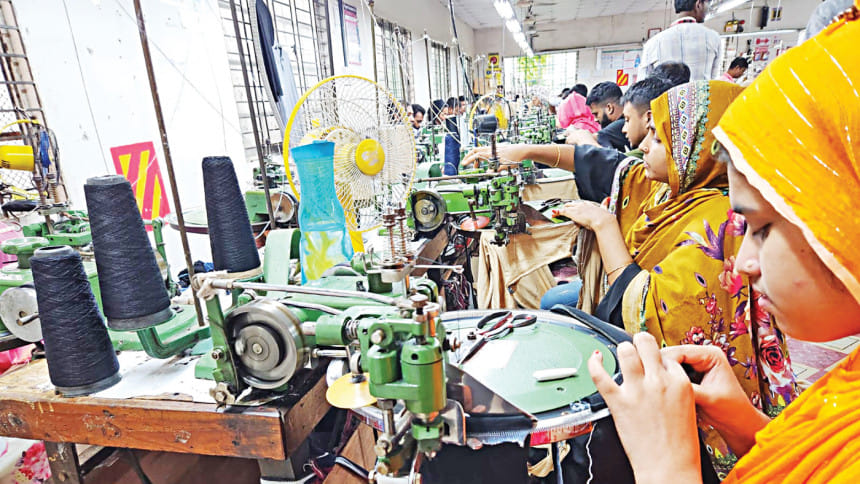Apparel exporters go into overdrive to meet deadlines

Garment exporters have gone into manufacturing overdrive to recover from continual production disruptions over the past three months due to nationwide protests and curfews, the fallout from the ouster of the previous government, and the recent spell of labour unrest at major industrial belts.
Factories are now operating around the clock to make up for the time lost in July, August and September -- the peak months for shipping Western orders centring Christmas and securing bookings for the upcoming autumn and winter seasons.
Besides, local exporters are turning to subcontractors and requesting extensions from international retailers to maintain long-standing business relationships.
According to Indian rating agency CareEdge Ratings, if the crisis continues for more than a quarter or two, nearly 10 percent of Bangladesh's ready-made garment (RMG) export orders could shift to market rivals like India and Vietnam.
At present, many exporters fear they will have to provide big discounts or opt for expensive air shipments due to production delays while some may face order cancellations.
According to apparel makers, shipping one kilogramme (kg) of dry cargo from Dhaka to Europe by air can cost over $4 while the same can be transported by sea for less than 10 cents.
Exporters said if international retailers and brands allow extensions to lead times considering the labour unrest and political changeover, they may be able to avoid adverse impacts.
"I have already requested extensions from the retailers and brands that I work with, explaining the recent labour unrest and political changes in the country," said AK Azad, chairman and managing director of Ha-Meem Group.
"I am hopeful that they will approve extensions if the current state of normalcy continues in the factories," he added.
Moreover, Azad is seeking subcontractors to ensure the timely production and shipment of goods.
Following the ouster of the Sheikh Hasina-led Awami League government on August 5 by a mass uprising, labour agitation in major garment industrial hubs flared up.
Their 18-point charter of demands included increased attendance bonuses and tiffin allowances.
After lengthy consultations with union leaders and the authorities during tripartite meetings, factory owners agreed to all 18 demands made by the workers and issued a joint statement on September 24.
Azad said all of Ha-Meem Group's factories are now operating at full capacity as normalcy is returning to industrial belts.
A major European retailer in Dhaka said his company did not cancel or seek discounts from any local suppliers due to the student movement, curfew, internet blackouts, political changeover or labour unrest, as they understood the turbulent political atmosphere.
"We are happy that normalcy is being restored to the sector," he said. "The shipment of our goods is now back on track."
Shams Mahmud, managing director of Shasha Denims, whose buyers include multinational giants like H&M and Marks & Spencer, said the labour situation has now stabilised and almost all factories are back in production.
"We are part of a global supply chain. Most of the orders we take are time-sensitive. Hopefully, with the improving law and order situation, we will be able to deliver goods on time," Mahmud added.
However, he said the backlog would likely lead to air shipments and discounts.
He noted that the financial implications of the situation require attention from the government and the central bank.
"Almost all RMG factories are currently burdened by forced loans due to mismatches in imports, exports, salaries, bank loan repayments and overdue payments," Mahmud said.
"Unless these issues are addressed promptly, especially for small and medium-sized garments, there could be long-term negative effects on macroeconomic stability."
He added that brands remain committed to Bangladesh.
"In all these discussions, the importance of Bangladesh's position, along with necessary investments in renewable energy and carbon reduction as well as the deployment of a circular ecosystem, is getting lost," he added.
Khandoker Rafiqul Islam, president of the Bangladesh Garment Manufacturers and Exporters Association, said on Wednesday that since normalcy is being restored to the garment sector, they would meet with major retailers and brands on Sunday or Monday to discuss the overall situation.
Buyers are expecting quick delivery, but they have not cancelled work orders yet, he said.
Islam also said that the garment sector lost over $100 million due to the recent labour unrest, as many factories were unable to produce goods and ship them on time. Buyers' visits to factories were also cancelled.

 For all latest news, follow The Daily Star's Google News channel.
For all latest news, follow The Daily Star's Google News channel. 





Comments